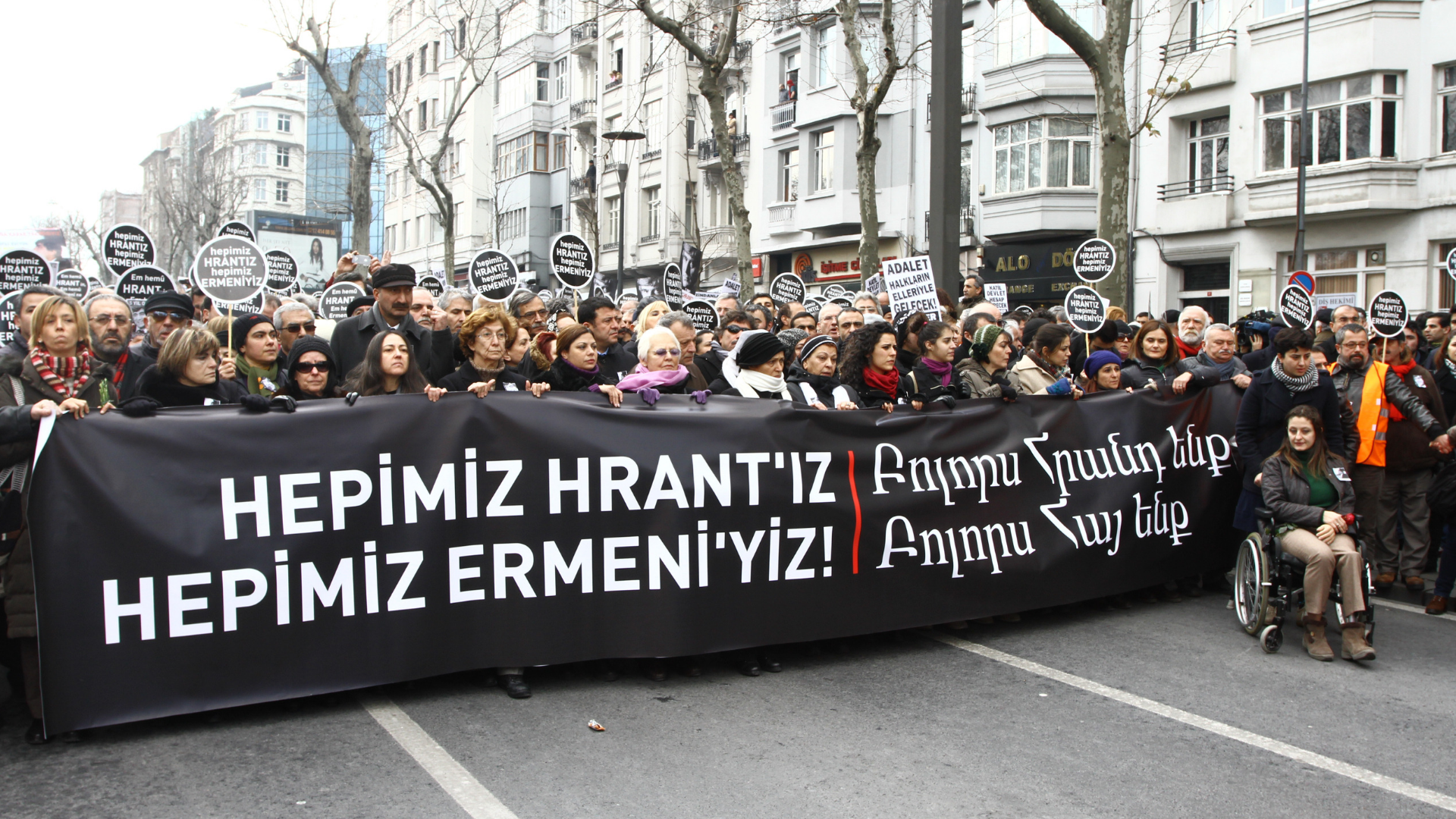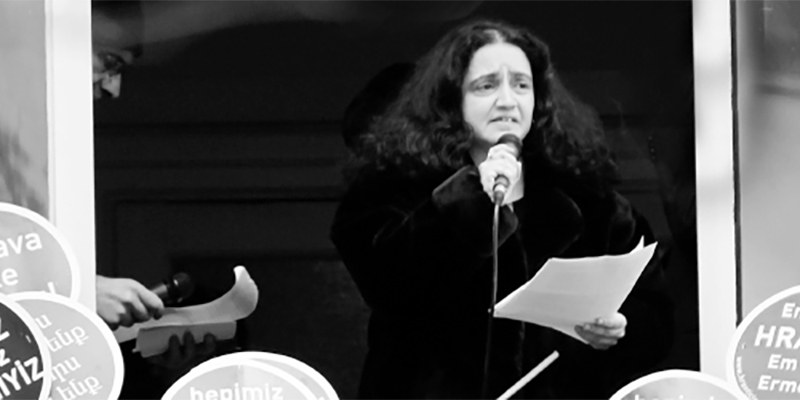Photos: Berge Arabian
Hrant Dink was assassinated 5 years ago in front of Sebat Building which used to house Agos Newspaper. Thousands of people commemorated him on Friday, January 19th. Those who participated in the commemoration voiced their demands for justice for the ongoing assassination trial.
This year the speech at the commemoration was held by Karin Karakaşlı, who was an editor and writer at Agos newspaper.
Karin Karakaşlı's speech:
19 January 2012- KARİN KARAKAŞLI
January 19th is not a commemoration day. It never has been. As a matter of fact, there has never been a commemoration day for every other single pain caused in these lands. Everyone lived alone with the pain when it was caused, everyone suffered by themselves.
And then came January 23rd. It was five years ago. The funeral of an Armenian journalist, who was convicted for ‘denigrating Turkishness’ and declared an enemy of Turks, brought us all together. For Hrant Dink was aspiring to remedy all the pains and sufferings of this country. He was shot in his back, in broad daylight, on this crowded Halaskargazi Avenue, where we also stand today. They made us all bear witness to this murder.
On his funeral day, we brought together 1915, Dersim, Maraş, Çorum, all the unsolved murders, revolts, state of emergencies, never-ending coup attempts. Whatever we were allowed to experience in our separate lives, divided into compartments, we made into one and we became one. We spoiled the big game and gave the show away thanks to his uniting spirit.
They did not kill him only once, dear friends. They first killed him with the General Staff’s statement issued in response to his news story about Sabiha Gökçen. They killed him at the Istanbul Governor’s office, as he was threatened by MIT (Turkish Intelligence Service) officials. They killed him by declaring Hrant Dink an enemy of the Turks, by plucking few sentences from his articles that promote peace and taking them out of context. They killed him when he felt obliged to explain himself in each article, in each interview, wasting his breath. They killed him the day when they gathered in front of Agos and chanted “From now on, Hrant Dink is the target of all our fury and hatred”. They killed him as they made him run from one court hearing to another, as they convicted him despite the expert report, and as they did not see any harm in upholding the sentence. They killed him as they threatened the life of his son, as if it was not enough to threaten him himself. They killed him as they made him endure so many other troubles that he did not even share with us.
And the rest followed in rapid succession. Erased wire-tapping records, tampered evidence, concealed information, destroyed reports, investigations that were closed, investigations that were not even initiated, intelligence officers acquitted due to statute of limitations. One followed another. It was well known that when Hrant Dink was alive, many suspects of the Ergenekon case, particularly Veli Küçük and Kemal Kerinçsiz, were orchestrating a criminal case and lynch campaigns against him. Then one day, the Operation Cage Action Plan came out. Yet to this date, they failed to establish a connection between this case and the Ergenekon case.
They surrounded us with lies. It has been like this for five years and they ultimately gave us two people and asked us to be content with them. This is more than enough for you.
As there is no talk of an armed terrorist organisation, there is no talk of its leaders or members either. And they acted in such a haste, in order to release Erhan Tuncel on the same evening he was acquitted, that they even forgot to rule about one of the suspects. Nowadays, Tuncel is a fresh university candidate, ready to dedicate himself to science and education. They took this decision with undue haste, as they looked straight into our eyes. We have both seen irresponsibility as well as enormous fear lying beneath it. We said the state has no clothes. The state is naked.
It is not so easy to use possessive pronouns. Yes, this is my country, but can I comfortably call this state my state? My President, my Prime Minister, my Ministers, my Government, my Opposition, my Parliament…There is only one requisite for me to refer to them as such: put an end to this disgrace. Let the Court of Cassation once again become a place of appeal for justice, despite its role in the process that led to the assassination. It is an obligation, an imperative, a duty to make this happen. For what we were made to suffer is ‘shameful, cruel, sinful’.
Hrant Dink is a loss for each and every one of us, however you may appreciate it; but his loss symbolizes yet another deprivation for Armenians. In April 1915, before convoys of people in Anatolia were forcibly marched into the desert without food and water, around 250 Armenian intellectuals were put onto trains at Haydarpaşa Train Station and were sent to exile in Ayaş. Only few could return.
As you see, they first took away our voice. These people were members of the Ottoman Parliament, authors, journalists, translators, doctors, lawyers. They believed in the Ottomans as much as they served the Armenian people; they believed they would see a feast after the Constitutional Monarchy. Things didn’t work out this way.
Right here, right now, I will utter the names of some of them. Let those that are called upon, hear their names, come over and say ‘here’: Ruben Sevag, Siamanto, Daniel Varoujan, Diran Kelekian, Erukhan, Rupen Zartarian, Hampartsoum Boyadjian, Smpad Piurad, Khyan Parsekhian, Krikor Zohrab… Hrant Dink is the last one in this chain of intellectuals. That’s why 2007 took us all back to 1915. This means that it is still quite easy to kill a person who is a true Armenian and a patriot at the same time. It is still quite permissible.
We came all the way here by persistently denying history. As much as it symbolizes Hrant Dink, let this stone placed on the pavement be a symbol of all silenced intellectuals and nameless, graveless victims.
Along with the most recent court ruling, we are once again back at January 19th, 2007, the day of the assassination. Hrant Dink would like to see us together, especially in times like these, when we feel overwhelmed by the operations and fed up with the conspiracies. It seems clear that this giant state had no clue what to do with the life and death of an ethnic Armenian citizen as such. So, it is now our duty to teach them how to do so.
The dossier has been closed, we are told. Is this dossier closed? Hrant Dink is not a dossier to be closed. He is a wound. We are at the last exit before the bridge. There is no score to settle, no hope to harbour, no justice to believe in, no country to live in until you cross it properly. Any other way would be a lie and one day will come upon us. We will stay under the heaviness of it.
This is why it is time to make a promise, not to simply say we will.
Shall we make a promise to each other that this struggle has not ended?
Shall we make a promise to each other that humanity has not died?
Shall we make a promise to each other that the state is yet to account?
We promise. Living with this injustice is forbidden for all of us. Be blessed all who struggle otherwise.
|
Karin Karakaşlı was born in Istanbul in 1972. She obtained her bachelor’s degree from the Department of Translation and Interpretation Studies at Boğaziçi University and her master’s degree from the Department of Comparative Literature at Yeditepe University, where she also taught. From 1996 to 2006, she worked at Agos as editor, columnist and managing editor. Her first novel, Ay Denizle Buluşunca (When the Moon Meets the Sea), was published in 1997 by Günışığı Kitaplığı and her first poetry book, Benim Gönlüm Gümüş (My Heart is Silver), in 2009 by Aras Yayıncılık. In 1998, her story writing earned her Varlık Magaziine’s Yaşar Nabi Nayır Prize for young poets and story writers, a prize awarded annually on the magazine’s anniversary and named after the magazine’s founder. Karakaşlı also worked at the Getronagan Armenian High School as a teacher of Armenian. In addition to her poetry and story collections, she continues to contribute to several magazines and newspapers. |


